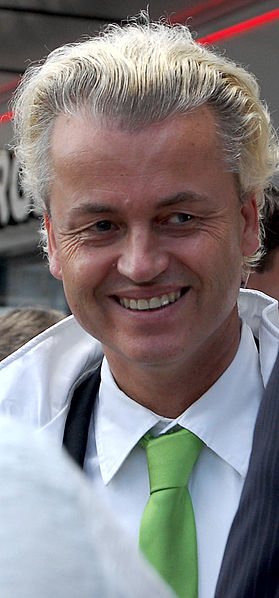In The Free Press, Ayaan Hirsi Ali and Evelyn Markus explain why Geert Wilders’ Party for Freedom took so many seats in the Dutch elections:

Geert Wilders, leader of the Dutch Party for Freedom (PVV).
Photo by Wouter Engler via Wikimedia Commons.
It was in 2004, the same year that Theo van Gogh was brutally murdered, that Geert Wilders saw his opening.
Though Wilders had been in Dutch politics for a long time, that year Wilders left the VVD — the center-right party where he served alongside Ayaan — and branched out on his own with a new party, the Party for Freedom. The key issue that led to his break was that Wilders refused to countenance the possibility of EU membership for Turkey (which the VVD was willing to accept as long as certain conditions were met).
Almost immediately, Wilders became the most controversial man in Dutch politics. He urged the banning of the Quran and a halt to the construction of new mosques. He railed against what he described as the “Islamization of the Netherlands”. When he asked a crowd in 2014 whether they wanted “more or fewer” Moroccans, the crowd chanted “fewer”, and Wilders replied that this was something that would be arranged. Prosecutors argued this constituted an illegal collective insult, and the Dutch High Court ultimately ruled that Wilders was guilty, but without sentencing him to a penalty.
It was easy to be scandalized by Wilders. The press and the political class certainly were. Some publicly supported Wilders’ prosecution in the “fewer Moroccans” case.
We disagreed — and still do — with Wilders’ calls for blanket bans on additional asylum seekers, with the notion of banning the Quran (let alone any book), and with his consistent failure to draw a distinction between Islam and Islamism.
But we understand how and why his message resonated with the public.
While elites over the past two decades have told the public to ignore their lying eyes, Wilders continued to emphasize the hot-button subjects that resonated with the public: the struggling economy, the importance of borders, the risks of devolving too much power to Brussels, the threat of Islamism, and the challenge of mass migration.
While elites told the public that opposing migration was xenophobic, ordinary people noticed structural changes in their country and felt they — the public — had not been adequately consulted. In the 1960s, 60,000 Muslims lived in the Netherlands; today there are around 1.2 million, thanks to massive chain migration, asylum, and a high birth rate. (Fewer than 50,000 Jews remain in the country.)
While political elites told the public to be tolerant of Islam, in keeping with a long-standing tradition of religious tolerance, ordinary people saw that Islamists were increasingly well-entrenched in the country, a point even made by Dutch intelligence officials. Although Wilders’ rhetoric can be uninhibited and extreme, he articulates a general and perfectly legitimate feeling among voters who know that Islamism is a threat to their way of life and want to oppose it. (Wilders has been the subject of sustained Islamist threats and has had to live his life within a tight security bubble because of them.)
While elites told the public that giving more power to the EU was an unqualified good, ordinary people took a more nuanced view. When we left the Netherlands in the early 2000s, the Dutch were solidly pro-EU. Today, although most Dutch voters do not wish to leave the EU, there are growing concerns that, especially when it comes to migration and borders, too much authority has been ceded to supranational institutions.
Over the years, we have heard more and more friends express private sympathy with Geert Wilders. And it should be noted that during the most recent campaign, he toned down some of his more extreme rhetoric. Previously, his party called for a “Ministry of Re-migration and De-Islamization”. That is no longer the case. Similarly, the phrase “Islam is not a religion, but a totalitarian ideology”, which was previously part of the election manifesto, was scrapped. This time around, Wilders emphasized his commitment to working within the Dutch coalition system, which he conceded would require him to make compromises in order to be able to govern.
The recent aggressive and occasionally violent pro-Palestinian demonstrations in the Dutch streets — as elsewhere — may have been the final blow that led to last week’s landslide. It’s worth noting that Wilders’ voters do not fit a crude stereotype — he won the most votes of any party among voters between the ages of 18 and 35.



